Politics
UN allocates additional $5m to aid Pakistan’s flood relief efforts
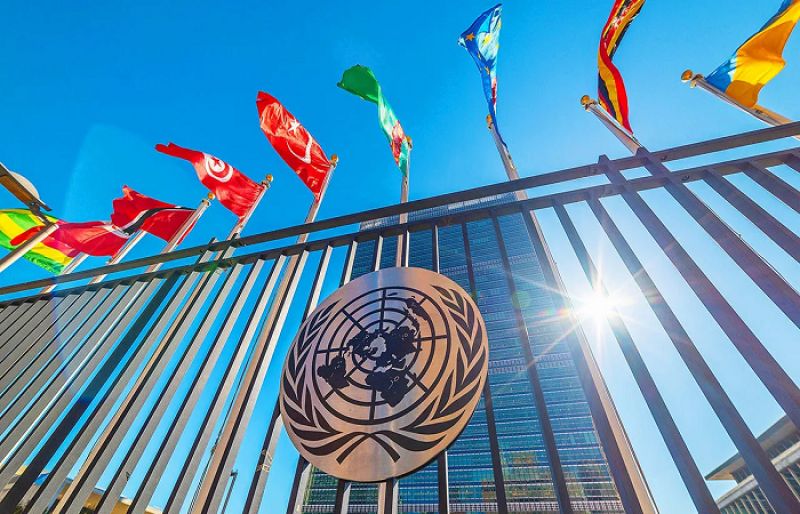

The United Nations Emergency Relief Coordinator, Tom Fletcher, has allocated $5 million from the UN Central Emergency Response Fund (CERF) to support Pakistan’s ongoing response to devastating floods, a UN spokesperson said Monday.
This new allocation adds to the $600,000 provided by OCHA’s Asia and the Pacific Regional Fund and the $250,000 approved by the Pakistan Country-Based Pooled Fund for local NGOs.
“The funds will be used for cash transfers, health, water and sanitation, shelter, and food, among other urgent needs,” UN spokesperson Stephane Dujarric told reporters during the regular noon briefing at UN Headquarters in New York, while emphasizing the need for additional funding to address the crisis.
“Our humanitarian teams are working closely with the government to deliver relief to survivors in flood-affected areas,” he added.
Dujarric also noted, citing UN reports, that many villages remain submerged, with water levels reaching up to 10 meters in some places, delaying humanitarian access and complicating efforts to assess the full impact of the floods.
Priority needs include sanitation and hygiene, health, shelter, food and water, he said.
“Our partners working in health have expressed concerns over a rise in waterborne diseases in many parts,” the spokesperson said.
“We are working to supporting the Government-led response and OCHA has deployed staff to the affected area in Punjab to support the coordination efforts.
“While these new funds will enable lifesaving aid, existing resources are nearly exhausted and urgent additional funding is critically needed”, Dujarric added.
Politics
Trump warns of swift new US strikes if Iran revives nuclear programme

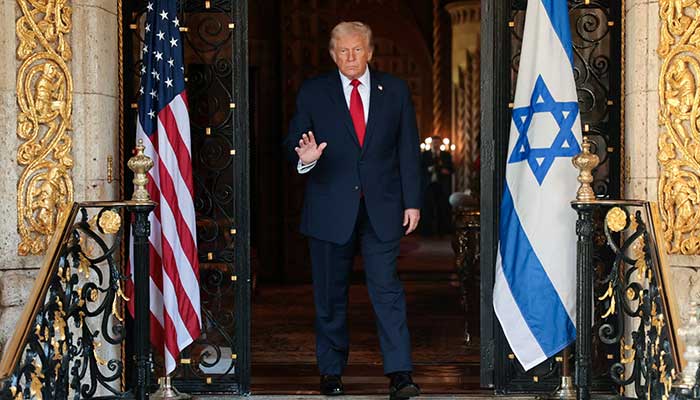
- Trump says open to negotiating smarter Iran deal.
- Hopes Israel moves towards better ties with Syria.
- Relays Putin claim of Ukrainian attack on residence.
US President Donald Trump on Monday said that the US would quickly launch new attacks on Iran if it is rebuilding the nuclear programme that he struck in June.
“I hear Iran is trying to build up again, and if they are, we have to knock them down,” he told reporters while welcoming Israeli Prime Minister Benjamin Netanyahu to his Mar-a-Lago estate in Florida to discuss the next phase Gaza plan. “We’ll knock the hell out of them.”
Trump also said he remained open to negotiating a “deal,” which he called “much smarter.”
“I feel that if you had the wrong prime minister, Israel would not exist,” Trump told reporters, in remarks full of praise for the Israeli leader.
He said Israeli President Isaac Herzog had told him he planned to pardon Netanyahu of corruption-related charges.
He added that he hoped Israel could get along with Syria, even as Netanyahu’s government has consistently infringed upon Syrian territorial sovereignty since former strongman Bashar al-Assad was deposed late last year.
Russia-Ukraine conflict
Trump further said that Russian President Vladimir Putin told him Ukraine tried to attack Putin’s residence in northern Russia, which Kyiv has denied.
Russia accused Ukraine of trying to attack Putin’s residence in northern Russia, although it provided no evidence to back up an assertion that Kyiv dismissed as baseless and designed to undermine peace negotiations.
“I don’t like it. It’s not good,” Trump told reporters when asked if he was worried the allegation could affect his efforts to broker peace. “I learned about it from President Putin today. I was very angry about it.”
“It’s a delicate period of time. This is not the right time. It’s one thing to be offensive, because they’re offensive. It’s another thing to attack his house. It’s not the right time to do any of that,” he said.
When asked if there was any evidence of such an attack, Trump said: “We’ll find out.”
He described his call with Putin earlier on Monday as a “very good talk.”
“We have a few very thorny issues,” Trump said about talks to end the war in Ukraine.
Russia controls about a fifth of Ukraine, including the Crimean peninsula, which it annexed in 2014.
It claims Donbas — comprising the Donetsk and Luhansk regions — as well as the Zaporizhzhia and Kherson regions, although they are all internationally recognised as Ukraine’s sovereign territory.
Russia wants Kyiv to withdraw troops from parts of the Donetsk region it has failed to occupy. Kyiv wants fighting halted along the current front lines, and Washington has proposed a free economic zone if Ukraine pulls troops back.
Politics
Peace hopes dented as Russia says Ukraine tried to attack Putin residence
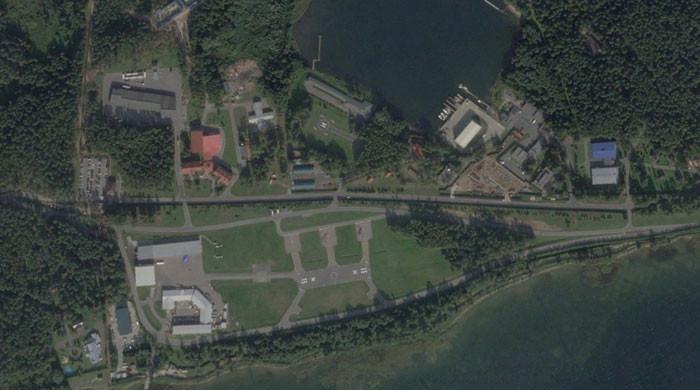
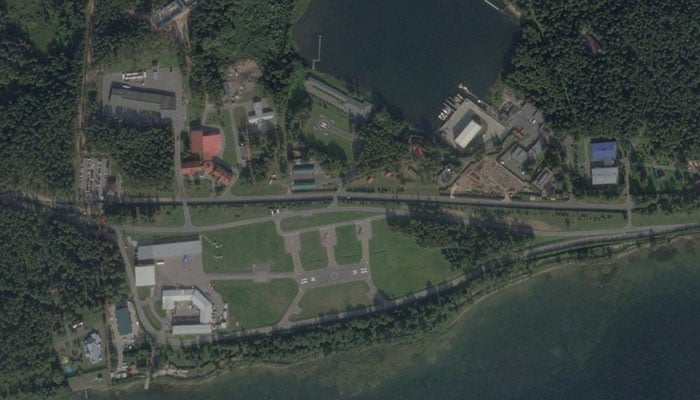
- Trump met Zelenskiy in Florida on Sunday.
- Ukraine says territorial issue remains unresolved.
- Ukraine denies accusation as fabrication to block peace.
MOSCOW/KYIV: Russia accused Ukraine on Monday of trying to attack President Vladimir Putin’s residence in northern Russia, although it provided no evidence to back up an assertion that Kyiv dismissed as baseless and designed to undermine peace negotiations.
The angry exchanges, including a statement by Russia that it was reviewing its stance in negotiations in response to the attack, dealt a new blow to prospects for peace in Ukraine.
On Sunday, US President Donald Trump met President Volodymyr Zelenskiy in Florida and said they were “getting a lot closer, maybe very close” to an agreement to end the war, although “thorny” territorial issues remained.
Putin also struck a defiant tone on Monday, telling his army to press on with a campaign to take full control of Ukraine’s Zaporizhzhia region, and the Kremlin repeated demands for Kyiv to pull its forces out of the last part of the Donbas area that they still hold in eastern Ukraine.
Putin told Trump by phone that Russia, which invaded Ukraine in February 2022, was reviewing its stance following the reported drone attack, an aide said.
Lavrov accuses Ukraine, Zelenskiy issues denial
Foreign Minister Sergei Lavrov said Ukraine had tried to attack Putin’s residence in the Novgorod region west of Moscow on December 28-29 with 91 long-range drones which were all destroyed by Russian air defences. No one was injured and there was no damage, he said in comments reported by Russian media.
“Such reckless actions will not go unanswered,” the veteran foreign minister said, describing the attack as “state terrorism” and adding that targets had already been selected for retaliatory strikes by Russia’s armed forces.
Lavrov appeared in televised remarks not to have offered any evidence for his assertions. It was not clear where Putin was at the time.
Lavrov noted that the attack took place during negotiations about a possible peace deal, and said Russia would review its negotiating stance but not quit the negotiations.
Denying Ukraine had planned such an attack, Zelenskiy accused Moscow of preparing the ground to strike government buildings in Kyiv, saying Russia wanted to undermine progress at US-Ukrainian talks on ending the war.
“Another round of lies from the Russian Federation,” Zelenskiy told reporters via WhatsApp.
“It is clear that we had a meeting with Trump yesterday, and it is clear that for the Russians, if there is no scandal between us and America, and we are making progress – for them it is a failure, because they do not want to end this war.”
He added: “I am sure they are simply preparing the ground for strikes, probably on the capital, probably on government buildings.”
Ukrainian Foreign Minister Andrii Sybiha said on X the attack was a fabrication intended to create a pretext for more Russian attacks on Ukraine and to undermine the peace process. He urged world leaders to condemn Russia over its accusations.
Territorial issues unresolved
Zelenskiy said a bilateral agreement had been outlined with Trump on security guarantees for Kyiv on Sunday, although the US president said they were only 95% ready and Zelenskiy said on Monday that he had sought a 50-year security deal.
Trump also said he expected European countries to “take over a big part” of security efforts with US backing. Agreement on such moves would be complicated, as Russia has said any foreign troop deployment in Ukraine would be unacceptable.
Zelenskiy said on Monday two main issues in a 20-point peace proposal remained to be resolved – control of Ukraine’s Zaporizhzhia nuclear power station, which is in Russian hands, and the fate of the Donbas area.
Russia controls about a fifth of Ukraine, including the Crimean peninsula, which it annexed in 2014.
It claims Donbas – comprising the Donetsk and Luhansk regions – as well as the Zaporizhzhia and Kherson regions, although they are all internationally recognised as Ukraine’s sovereign territory.
Russia wants Kyiv to withdraw troops from parts of the Donetsk region it has failed to occupy. Kyiv wants fighting halted along current front lines, and Washington has proposed a free economic zone if Ukraine pulls troops back.
Underlining Russia’s intention of standing firm on its territorial ambitions, Putin said on Monday his generals should push on with efforts to secure all of Zaporizhzhia region – of which Moscow already controls around 75%.
Colonel-General Mikhail Teplinsky, commander of Russia’s Dnieper military grouping, told Putin Russian forces were 15 km (9.3 miles) from its biggest city, also called Zaporizhzhia.
“In the near future, it is necessary to continue the offensive, together with the East grouping to liberate Zaporizhzhia,” Putin responded.
Politics
US pledges $2bn for UN aid, with ‘adapt, shrink or die’ warning
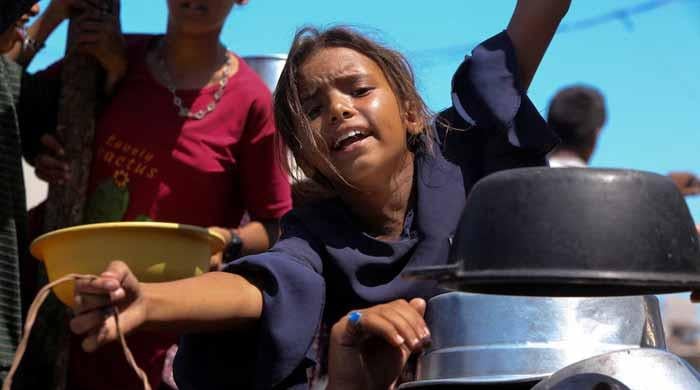

Washington on Monday pledged an initial $2 billion for United Nations humanitarian aid in 2026, far less than it has provided in recent years, warning individual UN agencies to “adapt, shrink or die”.
With its pledge, announced at the US mission in Geneva alongside the United Nations’ aid chief Tom Fletcher, the United States is pursuing a dramatic overhaul of how it funds UN humanitarian work.
Instead of handing funds to individual agencies, the United States will funnel its contributions through the UN aid agency OCHA, headed by Fletcher, which earlier this year launched a so-called Humanitarian Reset to improve efficiency and accountability.
The US funds will then be distributed to more than a dozen selected countries, including the Democratic Republic of Congo, Myanmar and Sudan.
“It is an initial anchor commitment,” Jeremy Lewin, the senior US official for foreign assistance, humanitarian affairs and religious freedom, told reporters.
“There are other countries that we will add, as we continue to get more funding into this mechanism.”
He challenged other countries to match or beat US funding for UN aid.
“This new model will better share the burden of UN humanitarian work with other developed countries and will require the UN to cut bloat, remove duplication, and commit to powerful new impact, accountability and oversight mechanisms,” US Secretary of State Marco Rubio said on X.
According to UN data, the United States remained the top humanitarian aid donor in the world in 2025, but that amount fell significantly to $2.7 billion, down from around $11 billion in 2023 and 2024, and from over $14 billion in 2022.
Other key donor countries have also been tightening their belts, triggering major upheaval in the global aid sector. “Individual UN agencies will need to adapt, shrink, or die,” a State Department statement said.
Hard priority choices
Fletcher, who is British, said the US pledge was an “extraordinary” commitment.
“The US has long been the world´s humanitarian superpower,” he said in a statement.
“Hundreds of millions of people are alive today because of American generosity — and many millions more will survive in 2026 because of this landmark investment in humanity.”
Fletcher said reform of the humanitarian system was in the pipeline, and US taxpayers would be able to see how their money was delivering life-saving impacts.
“The US is also placing a significant and encouraging vote of trust and confidence in the Humanitarian Reset, through which we are making humanitarian action faster, smarter and closer to the people on the front lines of emergencies,” he said.
“We’re cutting red tape, eliminating duplication and prioritising hard.”
When Fletcher launched the UN’s annual Global Humanitarian Appeal for 2026 earlier this month, he requested $23 billion to provide assistance to 87 million of the world’s neediest people, with a heavy focus on dire conflicts like those in Gaza, Ukraine, Sudan, Haiti and Myanmar.
The amount and number of people covered by the appeal has been dramatically reduced over recent years, as the UN strives to adapt to a new reality after President Donald Trump slashed US foreign aid spending.
The United Nations has stressed that the smaller appeal does not mean needs have shrunk.
It estimates that some 240 million people — in conflict zones, suffering from epidemics, or victims of natural disasters and climate change — are in need of emergency aid.
In 2025, the UN’s appeal for more than $45 billion was only funded to the $12 billion mark, the lowest in a decade.
That only allowed it to help 98 million people, 25 million fewer than the year before.
-

 Sports3 days ago
Sports3 days agoBrooks Koepka should face penalty if he rejoins PGA Tour, golf pundit says
-

 Sports1 week ago
Sports1 week agoPatriots vs. Ravens (Dec 21, 2025) Live Score – ESPN
-
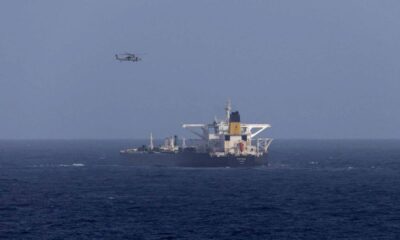
 Politics1 week ago
Politics1 week agoUS intercepts oil tanker off Venezuelan coast, Reports
-

 Entertainment1 week ago
Entertainment1 week agoDave Chappelle drops Netflix special, ‘Dave Chappelle: The Unstoppable…’
-

 Business1 week ago
Business1 week agoNeptune Logitek Shares List At 26% Discount, IPO Investors Suffer Nearly Rs 30,000 Losses
-

 Sports1 week ago
Sports1 week agoWATCH: Pakistan’s winning moment as Green Shirts clinch U19 Asia Cup title
-

 Business3 days ago
Business3 days agoGovt registers 144olive startups | The Express Tribune
-

 Sports1 week ago
Sports1 week agoWilliamson opens up about New Zealand future | The Express Tribune






